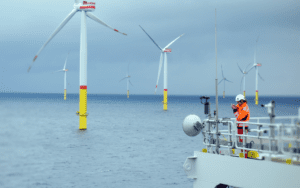In the second part of this series, key decision-makers from Vestas, Attentive Energy, RWE Renewables and Atlantic Shores share their real-world insight on retaining talent, and the importance of nurturing a strong corporate culture. Comments have been edited and condensed for clarity.
Jeff Anderson, Chair
I’ve been recruiting in offshore wind for 15 years now, and in the mature markets such as Europe we would typically see a three-to-four year cycle for candidates, after which they would look to move up to a new role. Here in the US we’re seeing that tenure being a lot shorter. So how do we make sure that isn’t the case – that we retain our talent, keep them engaged, making sure they grow the culture?
Nathalie Jouanneau, JV Strategy & Portfolio Manager, Atlantic Shores
For us, it comes a lot through our culture. I think the flexibility is a big part as well – we all expect in the post-COVID world to be able to be flexible.
We all have offices in different parts of the country, we have people outside of the US contributing to our projects, and we’ve been able to show that it works and it still makes great team that are well–connected. That’s definitely what we would consider normal.
The culture within a company, the flexibility that you provide, your respect for work-life balance, for mental and physical safety – these are really core values for our managers and the things that help with the retention of our staff.
The other aspects you mentioned: what are the prospects? And we’re lucky – at Atlantic Shores we have two big organizations on top [Shell New Energies and EDF Renewables] that can provide different perspectives. Of course, we have at least five gigawatts to deliver – so there will be work.
If you’re interested in the early development stage now, you have it. If you want to do construction, then you have it. If you want to do operations, you have it. And each project in our portfolio will have different phases – so you can also move from one place to the next in a higher role within your skillset.
So all of that is important: a large portfolio, the perspective of the industry generally, federal support. There will be more and more offshore wind, and so our job is to continue to support that and deliver on what we have promised so far – that will help keep people interested.
And then making sure that we have a workspace that is inclusive, that is diverse, that is attractive, that has good team spirit: it is hard work. And that you also have fun going to work and meeting your colleagues every day. It doesn’t sound as important sometimes as the project and the rate of return. But it is great, and sometimes even more important. So that’s where we put a lot of focus around right now in the organization: our culture, our identity.
Amy McGinty, VP Offshore Construction, Vestas
Right now the industry sells itself to to people coming into it, and the culture is absolutely great. We’re finding people are coming in very motivated, very excited.
Our challenge as leaders within these organizations is to continue that and make sure that we don’t lose it as the team continues to grow, because a lot of people like this “startup” feeling that the industry has. As it grows, we have to make sure that we retain people because I think we’ve got a great start here. It sounds like we have a similar kind of culture across the different organizations, but how do we make sure that we keep it going?
Claudia Soltys, HR Business Partner, RWE Renewables
Culture is hugely important, isn’t it? It’s not just the salary that is important to all of us, but when you look at the culture, you need to make sure that what you are building is interesting and attractive.
From the top down, our business leaders need to show day-in and day-out, they are the ones that to look to. Even taking the day off, for example. If we see people at the top never taking a day off – would we take days off? We can talk about introducing perks like mental health support, but are employees actually utilizing those benefits? It is up to us to really make sure that they do, by leading by example. Communication is a huge piece of that: we can have all the policies out there, but the employees are not always aware. We need to do more than just send reminders, because people have plenty of work to do and it’s easy to forget.
Damian Bednarz, Managing Director, Attentive Energy
I talked to someone who is finishing University, an electrical engineer. She’s yet to graduate, and she’s already talking to companies.
Roles like hers are going to have a huge pipeline, she’s going to have no problems finding work over the next ten years. Some of the people in her position will be interesting taking up an established role within an established project or organization. “There’s a system in place, I’m comfortable there, tell me where to plug in and I’ll play.” Then there will be people with the same position, looking at a less established organization, saying: “Oh, there’s 13 people here. You’re all still trying to figure everything out – do you guys have payroll set up? OK, cool, let’s go.” They like that scrambling, that start-up, hustle approach.
So that is, I think, the differentiator: we place a lot of importance on where people “sit” as we try to figure out their roles in the business, and it’s not the same for everybody. And knowing that distinction between companies, and what stage a company is at in its development, is important because it makes all the difference to its culture.
Read part one, with real-world insight on offshore wind hiring strategies and scaling-up journeys.
Read part three, on retaining culture in a new joint venture.
Read part four, on training strategies for new team members transitioning into offshore wind.
Read part five, on attracting the right talent.
Read part six, on salary and compensation.

